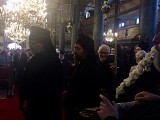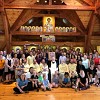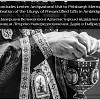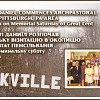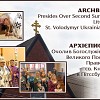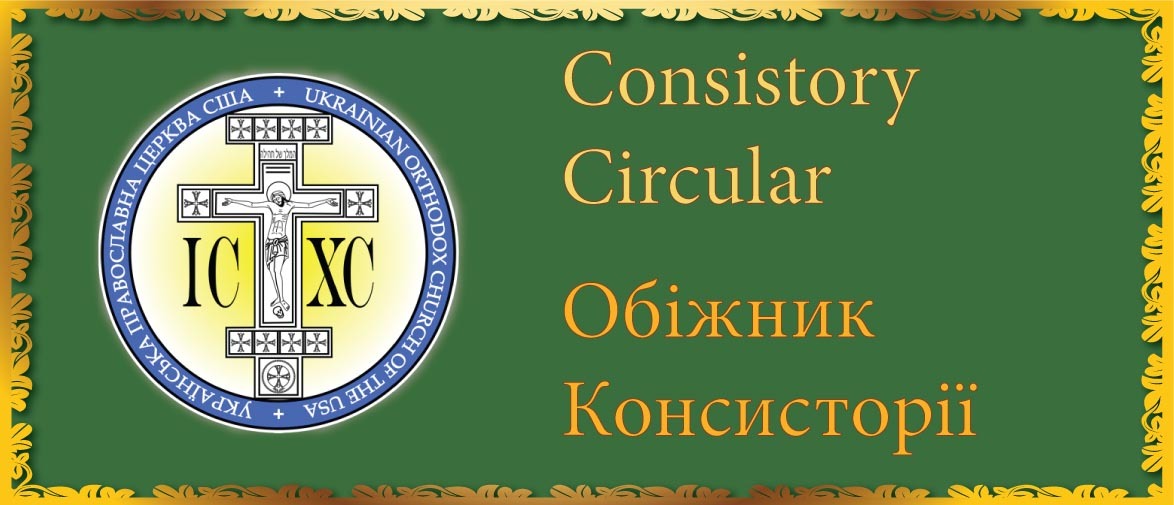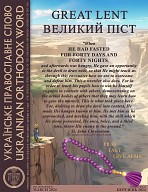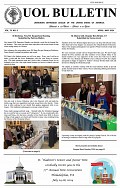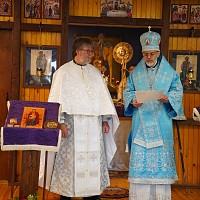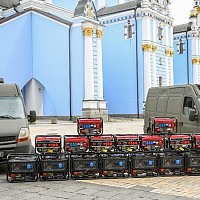For five days (31 August - September 4, 2018), His Eminence Archbishop Daniel of the Ukrainian Orthodox Church of the USA along with over 100 Orthodox Metropolitans and Archbishops of the Ecumenical Patriarchate from all over the world gathered in Constantinople (Istanbul, Turkey) in order to participate in a Synaxis (Assembly) of the Hierarchs of the Ecumenical Patriarchate convened upon the invitation and under the Presidency of His All Holiness Ecumenical Patriarch Bartholomew.
The meetings of the Synaxis began on September 1, 2018 following the celebration of the Divine Liturgy at the Patriarchal Cathedral of St. George in Constantinople (Istanbul) Turkey. The formal plenary sessions began at Holy Trinity Church in Taksim Square and will continue through September 4, 2018. In his opening remarks, greeting the hierarchs of the Church, Ecumenical Patriarch Bartholomew stated: “…All of the eparchial Hierarchs of the Mother Church, who represent the pious clergy and Christ-loving people of their eparchies, eagerly hastened to respond to our personal invitation and the fervent invitation of the Mother Church to participate in the deliberations of this Synaxis in order to fulfill their ecclesial and hierarchal duty, while at the same time demonstrating their sentiments of love and devotion to the Ecumenical and First Throne of the Orthodox Church, to which they belong canonically and ecclesiastically.
Permit us to take the opportunity of conveying our righteous pride as well as our great satisfaction and delight, along with our patriarchal commendation and wholehearted congratulations, to all of you as our most reverend brothers and concelebrants for the work that you conduct – each of you in the place that you were assigned – for the glory of God, the proclamation of the Gospel and the salvation of souls. Inasmuch as, by God’s mercy, we hold the primacy of honor in the Orthodox Church, we also have the capacity to be personally acquainted with many of the Hierarchs in the local Autocephalous Churches. This familiarity renders our inner conviction still more adamant that the Hierarchy of the Ecumenical Patriarchate maintains a high standard, being qualified to respond to the expectations of the Church and confront the challenges of our time, because it includes in its ranks worthy Hierarchs, virtuous theologians, educated scholars, passionate missionaries, renowned authors, erudite professors and excellent preachers. This is why we are deeply honored and proud of you, brothers, for comprising this dignified chorus of Hierarchs of the Throne of the Mother Church.
From the depth of our heart, we thank each and every one of you for your past and present labors, your known and unknown struggles, which you offer at the sacred altar of our humble Phanar as a pleasing sacrifice. We welcome you with great joy and pleasure to the courtyard of the venerable Center. And we wish you a pleasant and in every way enjoyable stay in the Queen of Cities, as well as a productive and beneficial participation in the sessions of this Holy Synaxis. As you know, for the Orthodox Church, intimate and personal communion constitutes an event and expression of faith – literally, a way of life – enabling us to move outside of ourselves in order to acquire an understanding in Christ of the meaning of life, to listen to the opinion of others, to further cultivate our perception, and to approach our fellow human beings with love. After all, for the One, Holy, Catholic and Apostolic Church, where all of us are humble servants, the perfect way of life is for us to be in communion with God and other human beings…
… The Ecumenical Patriarchate is, for Orthodoxy, a leaven “which leavens the whole lump” (cf. Gal. 5.9) of the Church and of history. Here, at the Great Church, we are not merely educated but become experienced in matters holy. We did not come to know the Sacred Canons by reading them in books, but by humbly serving the Mother Church, which disposes and defends the canons of Orthodoxy. We do not study theology only in theory, but live it out in practice, becoming initiated – peacefully and mystically – in how to know the unknown, see the unseen, and hear in silence the word of God that speaks in our hearts. As time unfolds, we become conscious of the fact that something magnificent is taking place, something that can only be reckoned a divine gift since our very existence is grafted onto the culture of the Mother Church, while all things are transformed and conceived as strange; the heavens are opened, new life emerges, and our existence welcomes the good change of the right hand of the Almighty.
This is why the Mother Church assumes a leadership role in disseminating sacred scholarship and theological learning, not shying away from secular knowledge in its experience and practice….
… Thus, with the grace of God, we journey through time and history with an awareness that the Orthodox Church is not the Church of triumphs but of trials; nor does it comprise an earthly theocracy, but the Church of Christ, namely the Church of the Last Times and His Kingdom, “which has no end.” As the guardian of the holy and sacred traditions of Orthodoxy, as well as of the dogmas alike of the Holy Seven Ecumenical Councils and other local councils, but also of the teachings of the Holy Fathers, the Ecumenical Patriarchate exists as “the small flock” (Luke 12.32), which seeks neither worldly renown or secular power, passionately loves “the word of God and testimony of Jesus Christ” (Rev. 1.2), enjoys canonical jurisdiction and all apostolic privileges in its responsibility for safeguarding the unity and communion of the local Churches but also for the overall journey of Orthodoxy in the contemporary world and history.
In this spirit, as President of the body of Orthodoxy, the Ecumenical Patriarch convened the Holy and Great Council in Crete in June 2016, the greatest ecclesiastical event in recent years. The souls of the late Patriarchs, Hierarchs, clergy, monastics and laity, who worked for the realization of this hallowed event rejoice. Such a Council constitutes a “great sign” of the love of the Supreme God, a true Theophany and Pentecost.
We offer glory to the Trinitarian God that he deemed us worthy of experiencing this vocation during our lifetime in order that, along with future generations, we might savor the work and labor of our fathers as well as the invaluable gifts of the All-Holy Spirit. It required almost a century for the Holy and Great Council to be conceived as an aspiration and finally convene. Had the Ecumenical Patriarchate and we personally surrendered to the various voices of fundamentalism and ethnophyletism, to the panic of introversion and isolation, ultimately denying this divine vocation, then this event would be recorded as one of the most painful defeats in the long and difficult history of our Orthodox Church. Nevertheless, glory be to God that the Council took place and the necessary decisions were taken on the six items of the agenda: 1) The Mission of the Orthodox Church in Today’s World, 2) The Orthodox Diaspora, 3) Autonomy and the Means by which it is Proclaimed, 4) The Sacrament of Marriage and its Impediments, 5) The Importance of Fasting and its Observance Today, and 6) Relations of the Orthodox Church with the Rest of the Christian World. The Council further approved the Encyclical and Message to the faithful, two significant documents that reveal the sensitivity and concern of the Orthodox Church for the contemporary world in light of the great challenges of our time…
… No matter how much some wish to embellish the situation in Ukraine, history proves them wrong and presents indisputable arguments demonstrating that the origin of difficulties and reactions in Ukraine are neither a recent phenomenon nor something created by the Ecumenical Patriarchate. Already from the early 14thcentury, when the see of the Kievan Metropolis was moved without the canonical permission of the Mother Church to Moscow, there have been tireless efforts on the part of our Kievan brothers for independence from ecclesiastical control by the Moscow center. Indeed, the obstinacy of the Patriarchate of Moscow was instrumental in occasionally creating repeated mergers and restorations of ecclesiastical eparchies, uncanonical elections of Bishops as well as schisms, which still afflict the pious Ukrainian people.
However, beyond all this, a study of the matter in the light of the sacred canons does not justify any intervention whatsoever by the Church of Russia. The Tome proclaiming Moscow as a Patriarchate does not include the region of today’s Metropolis of Kiev in the jurisdiction of Moscow. Moreover, after the well-known manner of proclamation of Moscow as a Patriarchate by Ecumenical Patriarch Jeremiah II (Tranos), the canonical dependence of Kiev to the Mother Church of Constantinople remained constant and uninterrupted. In the year 1686, our predecessor, the late Patriarch Dionysios IV, following great political pressure from the harrowing circumstances and for peace in the local Church, was obliged to issue a letter granting Moscow the license to ordain the Metropolitan of Kiev on the inviolable condition that every Metropolitan of Kiev would commemorate the name of the Ecumenical Patriarch as his ecclesiastical superior and authority, but also to demonstrate the canonical jurisdiction of Constantinople over this Metropolis.
As far as we know, no other act changing the canonical state of Kiev or revision of the condition to commemorate Constantinople has ever occurred; nor of course has there been any such change on the part of the Mother Church ceding Kiev completely to Russia. The uncanonical interventions of Moscow from time to time in the affairs of Kiev and the toleration on the part of the Ecumenical Patriarchate in previous years do not validate any ecclesiastical violation. Instead, the terms of the 6thCanon of the First Ecumenical Council in Nicaea are precisely valid in this case, as the commentator Aristinos observes: “Each patriarch should be satisfied with his own privileges and not snatch the privileges of another eparchy, which does not lie within or under the authority of his jurisdiction. For this is the conceit of worldly power.” (Rallis-Potlis, Constitution of the Holy and Sacred Canons, Volume 2, p. 131) In this spirit, the Mother Church did not concede its canonical rights over Ukraine, but incorporated a special reference in the Patriarchal and Synodal Tome “about the granting of the status of autocephaly to the Church of Poland” (1924), noting that “the original detachment from our Throne of the Metropolis of Kiev and its dependent Orthodox Churches of Lithuania and Poland, along with their attachment to the Holy Church of Moscow did not at all occur in accordance with the conventional canonical regulations; nor were the agreed statements about complete ecclesiastical self-sufficiency of the Metropolitan of Kiev, bearing the title of Exarch of the Ecumenical Throne, respected . . .”
In any case, it is true that the occasional deliberate efforts of the Church of Russia to resolve this matter failed. Thus, since Russia, as the one responsible for the current painful situation in Ukraine, is unable to solve the problem, the Ecumenical Patriarchate assumed the initiative of resolving the problem in accordance with the authority afforded to it by the Sacred Canons and the jurisdictional responsibility over the eparchy of Kiev, receiving a request to this end by the honorable Ukrainian Government, as well as recurring requests by “Patriarch” Philaret of Kiev appealing for our adjudication of his case.
At our instruction, the right reverend Bishop and professor Makarios of Christoupolis studied the question of Ukraine for many days, and the fruit of his extensive research into this complicated matter was a document of over ninety pages, which His Grace offered to the Mother Church. We thank and congratulate him. And since he already has a firm grasp of the issue, we have asked him to address this Venerable Body on the ecclesiastical perspective of the timely issue of Ukraine, and we are certain that all of us will have much to benefit from listening to him…
…We imagine that all of the Hierarchs serving within the jurisdiction of the Ecumenical Throne know very well that the 4thEcumenical Council, among other decisions, honored the exceptional privilege of “the right to appeal” (ekkliton) of the Throne of Constantinople with the decrees of its 9thand 17thCanons. Numerous instances of the exercise of this right to appeal by Hierarchs and clergy of other jurisdictions have been recorded through the centuries in the historical journey of the Mother Church. Worthy of mention here is the determination of the canonist Miodrag Petrovic, that “the Archbishop of Constantinople alone has the privilege to judge and adjudicate conflicts of bishops, clergy and metropolitans of other patriarchs.” (Nomocanon on the 14 Titles and the Byzantine Commentators, p. 206)
The right reverend Bishop Kyrillos of Abydos, Professor at the National and Capodistrian University of Athens, a devout scholar of the written and spoken word, will address the unique privilege of the Church of Constantinople to receive the appeal of Hierarchs and clergy seeking refuge from all local Orthodox Churches in his presentation, entitled “The Privilege of Eccliton (Right to Appeal): Historical, Canonical and Theological Perspectives.” We gladly await his analysis of this subject…
… Most reverend and dearly beloved brothers and concelebrants,
In times of greater or lesser historical challenge, our Patriarchate – faithful to its vocation and ministry – neither says nor does anything unrelated to the incarnate Word. Its mission is not comprised of imposing some new ecclesiological principles but preserving truths of faith, precious traditions and inspired patristic teachings established many centuries ago. The Mother Church does not create or shape its own church management; nor does it complete the Gospel, like the Grand Inquisitor of the renowned Russian author Fyodor Dostoevsky. As the First Throne of Orthodoxy, the Ecumenical Patriarchate exercises a prophetic ministry, extending the mystery of the Catholic Church in Christ Jesus throughout the world in each era.
At times, we confront trials and temptations precisely because some people falsely believe that they can love the Orthodox Church, but not the Ecumenical Patriarchate, forgetting that it incarnates the authentic ecclesiastical ethos of Orthodoxy. “In the beginning was the Word . . . in him was life, and the life was the light of men.” (John 1.1,4) The beginning of the Orthodox Church is the Ecumenical Patriarchate; “in this is life, and the life is the light of the Churches.” The late Metropolitan Kyrillos of Gortyna and Arcadia, a beloved Hierarch of the Mother Church and personal friend, was right to underline that “Orthodoxy cannot exist without the Ecumenical Patriarchate.”
During the first millennium, our blessed forefathers confronted the temptation of heresy. The great temptation of the second millennium, which was also bequeathed to the millennium we have now entered, is the status of jurisdictions. The source of this problem is ethnophyletism, the propensity to expansionism and the disregard of the boundaries defined by the Patriarchal and Synodal Tomes. The Ecumenical Patriarchate bears the responsibility of setting matters in ecclesiastical and canonical order because it alone has the canonical privilege as well as the prayer and blessing of the Church and the Ecumenical Councils to carry out this supreme and exceptional duty as a nurturing Mother and birth-giver of Churches. If the Ecumenical Patriarchate denies its responsibility and removes itself from the inter-Orthodox scene, then the local Churches will proceed “as sheep without a shepherd” (Matt. 9.36), expending their energy in ecclesiastical initiatives that conflate the humility of faith and the arrogance of power.
All the grandeur of our Patriarchate is exhausted in the service to the mystery of the Church. Its uniqueness does not lie in the possession of some superhuman secular power, but in the humble and selfless desire to subject the temptation of power to grace, while transforming the insecurity and fear of possessing and dominating to freedom and grace. It is here that we experience the final glory of the spirit identified with the ultimate humility, the power “fulfilled in weakness.” (2 Cor. 12.9)
In this sacramental task, brother Hierarchs, you too contribute to an enormous degree and level so that, at this sacred moment, we feel an ardent need to address you with the words of Christ: “You are my friends.” (John 15.14) “Abide in me, and I in you. As the branch cannot bear fruit by itself, unless it abides in the vine, neither can you, unless you abide in me.” (John 15.4) The Ecumenical Patriarchate is an eruption “like the rush of a mighty wind” (Acts 2.2), which dissolved and disperses all that is false and fabricated, distorted and perverted. Consequently, all of us should be more closely connected to the First among us in order to drink from the fountain that springs abundantly from the sacred source of our pious Nation and blameless Faith.
In concluding our address, let us offer glory and gratitude to God who is worshipped in Trinity for deeming us worthy of this immense joy to assemble again in the same place after three years, in accordance with our personal promise, so that we might deliberate together in the name of our Lord Jesus Christ, who is in our midst. We thank all of you once more and many times over, joyfully greeting and embracing each one of you, while proclaiming with one voice and one heart: May the name of the Lord be blessed, from now and to the ages…”
Various addresses were presented by senior Metropolitans and Archbishops on ecclesiastical, pastoral and theological initiatives and ministries, including the successful completion of the Holy and Great Council. The following topics were already presented for reflection and discussion:
“Granting Autocephaly and the Relevant Privileges of the Mother Church: historical, Canonical and Theological Perspectives,”
“The Privilege of Eccliton (Right to Appeal): historical, Canonical and Theological Perspectives.”
“An Assessment of the Recent Visits by the Patriarchal Delegation to the Local Orthodox Churches.”
“The Ecclesiastical Issue of Ukraine.”
“Historical Survey of the Church of Ochrid in Relation to a New Identity.”
“The Canonical and Ecclesiological Restoration of the Church of Skopje.”
“The Ecumenical Patriarchate and Its Eparchies Abroad.”
“The Ecumenical Patriarchate and Theological Learning.”
On Friday afternoon (31 August, 2018), prior to the beginning of Great Vespers for the feast in commemoration of the New Indiction and Synaxis of the Sacred Icon of Panaghia Pammakaristos, which is treasured in the most venerable Patriarchal Church, His Eminence Archbishop Daniel visited one of the Orthodox Christian cemeteries in Constantinople - on the grounds of Patriarchal and Stavropegic Monastery of the Life-Giving Spring in Baloukli, a place of final rest of numerous Patriarchs of the Ecumenical Throne. Vladyka Daniel venerated the grave of Patriarch Athenagoros of blessed memory, who showed an incredible kindness to the Ukrainian Orthodox Church in Diaspora throughout his Patriarchal service in the Great Church of Christ.
On September 1, following the Divine Liturgy at the Patriarchal Church of St. George, His All Holiness, followed by all the hierarchs, in keeping with an impressive and centuries old tradition, signed the Act of the New Indiction marking the beginning of the Ecclesiastical New Year. In addition, this day is also set aside by the Ecumenical Patriarchate as one of prayers for the preservation and protection of the natural environment, which is observed by all sister Orthodox Churches in the world.
More than 100 hierarchs signed the Act of Indiction, in order of seniority, beginning with His All-Holiness Ecumenical Patriarch BARTHOLOMEW and continuing to the most recently consecrated ruling bishop.
His Eminence Archbishop Daniel is scheduled to return to the United States of America on September 3, 2018 in order to be able to celebrate the first Divine Liturgy of the New Academic year with the Seminarians of St. Sophia Ukrainian Orthodox Theological Seminary on Septembr 4that 7AM and to prepare to depart for Brazil later that evening for the celebration of the 25thAnniversary of Archpastoral consecration of Archbishop Jeremiah of South America.
Archbishop Daniel Participates in Synaxis of Hierarchs of The Ecumenical Patriarchate of Constantinople - 09/01/2018
Photos by Archdeacon Panteleimon, Dimitrios S. Panagos and Andrii Gudko
(43 images)
|
| |||||||||||||
